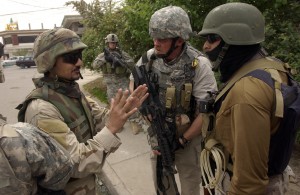Yesterday in the Wall Street Journal, Kirk Johnson penned an article examining the relationships the United States has built with individual Iraqis, and concluded it has not done nearly enough to help the Iraqis that are in danger as a result of their assistance.
This is incredibly concerning. Aside from the obvious moral and humanitarian issues involved with leaving America’s friends to the proverbial wolves, this runs the risk of endangering future partnerships. It can often take years to gain people’s trust, but only a few moments to lose it—and generations to regain it. Public diplomacy relies on being credible, following through on promises, and building trust relationships. Leaving our partners to fend for themselves runs contrary to all of these things.
Many Iraqis and many Afghans have undoubtedly risked their lives to help the U.S. in one way or another. Whether that help was provided out of personal beliefs, or the stark necessity of living in a wartime environment may be indeterminable—but the U.S. should not take that help for granted.
Policy makers should strongly consider what effects these types of actions will have in future situations where the U.S. needs friends and allies in various areas of operation. Will the U.S. refusal or inability to help these people have consequences further down the road? Will others see the example of those who risked their lives for the U.S. and died as a result as reason enough to not help the United States in the future? If the United States isn’t willing to do more to protect its friends, why should they bother to help?
Debate about the commitment of the United States to the future of these countries aside, commitment to individuals in those countries is a serious issue. Certainly, while the United States has limits on the number of people it can take in and protect, it can do more than it is currently doing. As Johnson points out:
In 2007, Congress passed legislation opening up 25,000 visa slots for U.S.-affiliated Iraqis, but the provision is due to expire in the fall—with about 18,000 unused slots. Even if Congress reauthorizes the program, at its current pace it would still take the State Department about 17 years to issue the remaining visas.
The question is, why is the United States neglecting to follow through on its promises to such a large extent?



